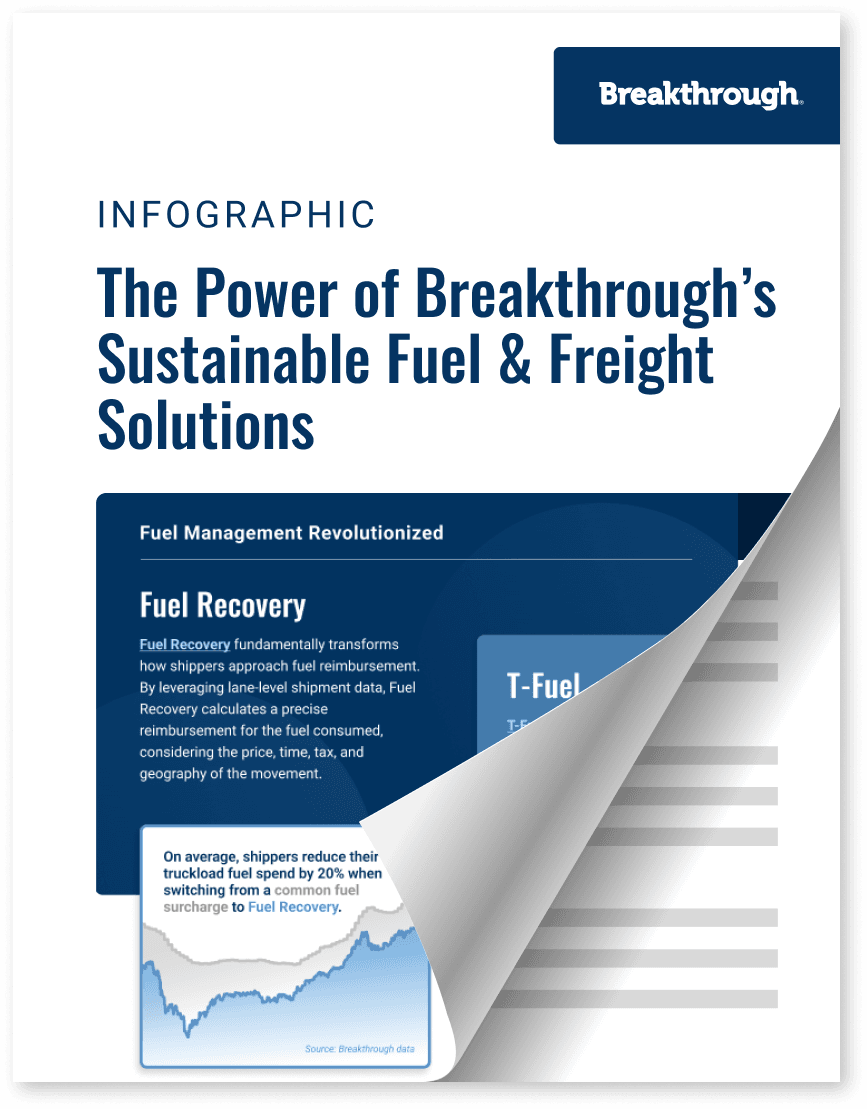The Power of Breakthrough's Sustainable Fuel and Freight Solutions

Freight
3 min read
July 17, 2024
Market Events
4 min read
July 16, 2024
Market Events
3 min read
July 8, 2024

4 min read
February 15, 2018

Share:
The marine landscape is continuing to evolve as shippers are busy with contract season during the first months of 2018. Rising bunker fuel prices and the International Maritime Organization’s (IMO) move to ban non-compliant fuel on board ships in 2020 are among the latest developments that will apply upward pressure to fuel surcharges. Additionally, the closure of the Transpacific Stabilization Agreement (TSA), a research and discussion forum of major ocean container shipping lines, demonstrates how much uncertainty the marketplace holds for carriers and shippers alike. With less than two years to plan for the IMO’s global sulfur cap regulations, market dynamics have just begun pushing marine fuel prices to their future crest.
Carriers are addressing increasing fuel costs for 2018 contracts. Hapag-Lloyd announced on January 25th that it would update its fuel surcharge amounts monthly, rather than quarterly. Days later, the carrier released a second announcement regarding marine fuel when it issued a series of “emergency” bunker surcharges across several geographies. Hapag-Lloyd cited upward fuel price pressure as the determining factor for adjusting their policies, and they are not alone. Maersk line is increasing contract rates across all geographies following a difficult fourth quarter in 2017. Higher bunker fuel prices pushed Maersk’s expenses 3.7 percent higher to finish the year, according to a report from Bloomberg. Maersk’s Chief Commercial Officer, Vincent Clark, has stated, “Maersk Line is increasing contract rates across all geographies to levels that exceed the bunker fuel price increases.”

Carriers are pressured to adjust their surcharges because bunker prices climbed through the fourth quarter of 2017 and stayed strong during the first month of 2018. The chart above shows average IFO380 and LSMGO prices across a selection of benchmark ports. Collectively, the ports of Houston, Rotterdam, Singapore and Fujairah experienced an average increase of 18 to 20 percent for high and low sulfur fuels alike during the past calendar year (averages shown in chart above). The average LSMGO price increased about 35 percent across these ports since June 2017. The difference between these high and low sulfur fuels reached $252/MT to finish January, its highest value of the past year.
Fuel costs do not account for the full scope of uncertainty among the container shipping industry. On Thursday, February 8th, the TSA – a research and discussion forum of container shipping lines offering services between Asia and the US – ceased it operations due to declining membership. The plunge in membership came in part from pressure created by the US House of Representatives choosing to revisit possible changes to the Shipping Act of 1984, from which carriers may be forced to choose between membership in rate discussions and ocean carrier alliances. The TSA offered voluntary, non-binding rate and service guidelines that member lines could have used in their service contract negotiations with shippers. The TSA had lost membership and traction in recent months; it discontinued publishing its guideline formula for calculating fuel costs in July, citing changing market conditions and cost structures as making its efforts to create a single benchmark unrealistic.
The developments highlighted above demonstrate cost components of marine fuel will become more difficult to account for within traditional surcharge programs as the 2020 IMO sulfur regulations approach. Actual fuel prices, vessel consumption and regulatory costs are buried within carriers’ current bunker surcharges and/or all-in rates. Uncertainty will prevent shippers from making efficient decisions when choosing which carriers to partner with.
Breakthrough’s Marine Fuel Management program allows for full visibility into individual freight movements, resulting in shippers’ ability to manage fuel costs and make decisions using clear data.

3 min read
July 17, 2024
Maximize transportation efficiency with cohesive fuel and freight strategies. Discover the power of enhanced visibility, cost-effectiveness, and sustainability.
Read more
4 min read
July 16, 2024
Discover how the recent elections in Mexico and the EU are expected to influence energy policies, fuel prices, and dynamics in the transportation sector.
Read more
3 min read
July 8, 2024
Understand the state-specific changes in diesel tax rates and explore strategic solutions for shippers to accurately calculate fuel reimbursements to carriers.
Read more